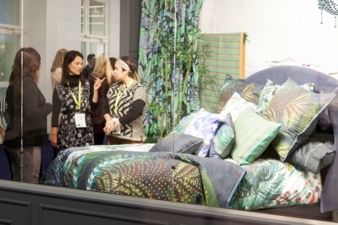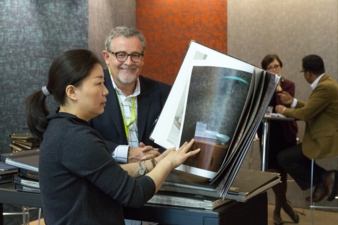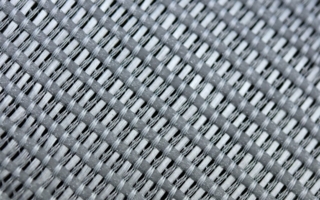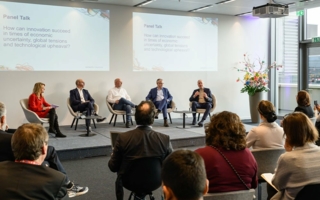21/02/2017 – Heimtextil 2017 — auf Deutsch lesen
Confidence and insecurities
War in Syria, Iraq and Yemen, Brexit and the election of the property tycoon, entertainer and billionaire Donald Trump as President of the USA gave exhibitors and trade visitors plenty of food for thought and discussion.
Considered by many as an industry barometer, home textiles fair Heimtextil provided a stage for much discussion in January 2017. War in Syria, Iraq and Yemen, Brexit and the election of the property tycoon, entertainer and billionaire Donald Trump as the 45th President of the United States of America gave exhibitors and trade visitors plenty of food for thought and discussion, as they considered the impact all these factors may have on the international textiles industry. A total of 2963 exhibitors from 67 countries took part in the event, with the largest exhibitor groups coming from China (549 including Hong Kong), India (391) and Germany (322), and the overall number climbing 3.5 percent on the previous event.
The majority of exhibitors were satisfied with the outcome of the fair, even though many were unable to benefit directly from the German buyers. The only Malaysian exhibitor Fernex Sdn. Bhd. from Kanang, in the state of Selangor, exhibited bed linen and mainly cushions. “We are presenting five new cushion collections here in Frankfurt. One of them is made from washable polyurethane foam. Our cushions are branded with Outlast and can regulate temperatures themselves,” states Lee Kheang Lim, Marketing Director of Fernex Sdn. The medium-sized company has a production facility in Johor Bahru and a second site in the Chinese metropolis Shanghai. During the fair, the enterprise forged contacts mainly with buyers from Europe, the Middle East and Korea.
The strong presence of Asian exhibitors shows that Asia will continue to play a strong role in the global textile trade long into the future. China and India took the lead with 521 and 391 exhibitors respectively, squeezing Germany’s 322 exhibitors into 3rd place. Large exhibitor groups were also recorded from Turkey (245), Pakistan (218), Taiwan (65), South Korea (23), Bangladesh (23) and Japan (18); even Iran put in an appearance with three exhibitors.
Olaf Schmidt, Vice President Textiles and Textile Technology with Messe Frankfurt, stated in an interview with textile network: “Heimtextil isn’t a German trade fair. It is an extremely international affair as it attracts buyers from all four corners of the globe, even from Asia, because they know they will find the latest innovations and trends in the textile sector here.”
The Turkish company Guleser Tekstil specialises in upholstery and drapery textiles made mostly from natural fibres, with a special focus on curtains and upholstery textiles in the medium price bracket. Producing around 2,000 designs every year, the company based in western Turkey’s Bursa, sees the UK as an important market that currently absorbs 50 percent of its exports. “Our buyers in the UK will probably have to increase their prices in the wake of Brexit,” says Deputy Managing Director Engin Ocak. “Our sales agents in the UK are expecting prices to increase by 10 percent. We’ve already responded by reducing our prices.” Guleser is not so much in direct competition with Turkish companies but rather with Italian suppliers, claiming that his prices are lower but the quality is equally as good. He has set his sights on tapping into the Iranian market. This market, he says, is slowly but surely opening up and the abolition of sanctions is benefitting the textile trade.





